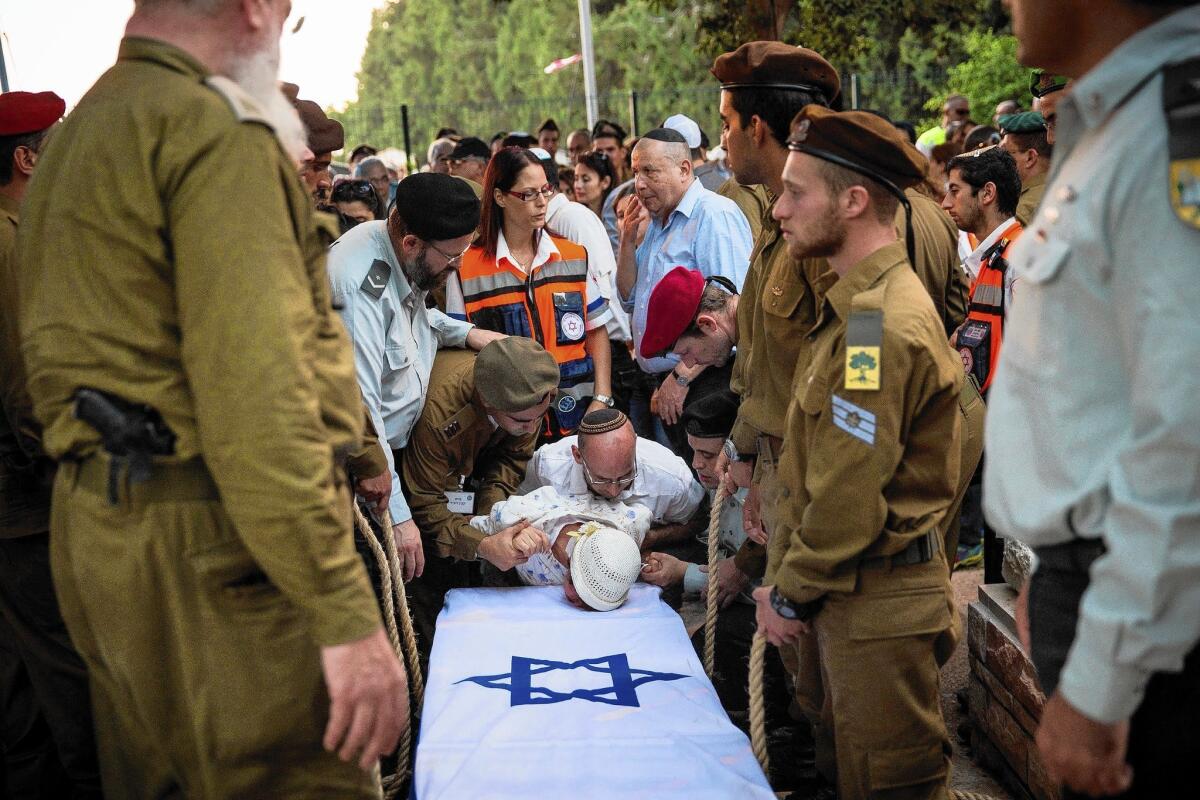Israel losses in Gaza prompt debate about offensive

- Share via
Reporting From Mazkeret Batya, Israel — It was somehow a typically Israeli setting: rolling farm fields incongruously nestled near an air base abuzz with the bustle of war.
The mourners at the burial Tuesday of Master Sgt. Ohad Shemesh, killed in combat a day earlier in the Gaza Strip, were old and young, in army uniforms or in shorts and sandals, weeping or stoic, much like those at other military funerals that have come to punctuate these sun-scorched days.
Many were not relatives, friends or even acquaintances of the fallen soldier. They were there in solidarity, drawing closer to fellow Israelis as the conflict with Palestinian militants leaves many here feeling increasingly isolated.
In nearly every corner of Israel, anxiety about fathers, sons and brothers in combat now pervades daily life. Families track every bit of information about the fighting. Communities organize care packages for soldiers, with donation carts set up in supermarkets and mom-and-pop groceries. Children write notes to troops, delivered by volunteers. Kibbutzim close to Gaza take in soldiers’ laundry, a gesture welcomed by troops who have spent weeks in the field.
The deaths of at least 27 troops in six days of ground fighting — 13 of them Sunday — are the Israeli military’s largest loss of life in nearly a decade, since the monthlong war in Lebanon in 2006. In a close-knit country in which army service is still a communal rite of passage, few families or communities are untouched by a massive military mobilization: 59,000 reservists called up for duty.
More than 150 soldiers have been injured in the fighting, with dozens of them hospitalized. Their parents have been camping out in hospitals in the southern cities of Ashkelon and Beersheba, many sleeping on the floor or on donated mattresses.
With the Palestinian death toll surpassing 600 and images of maimed Gazan children filling television screens around the globe, the mood in Israel is somber. Many people believe that responsibility for the bloodletting lies with Hamas, the Islamist militant group that is accused by Israeli officials of using the Palestinian populace as human shields as its fighters dig infiltration tunnels and launch rockets and missiles from crowded residential neighborhoods.
But sharp political debate is also raging between the Israeli right and left, with hawks calling for a decisive blow against Hamas, whatever the price, and doves urging a negotiated end to the fighting. Some protests have turned into brawls, and Arab communities have erupted in antiwar demonstrations.
The military deaths forge a silent sense of unity, crossing the lines that often divide Israelis: religious and secular, native or immigrant, conscript or reservist. Roadsides are lined with banners wishing soldiers a safe return home.
For Israelis, Tuesday was a day bracketed by news that stirred a sense of collective foreboding: early-morning word from the army that an Israeli soldier was missing in Gaza, and a late-afternoon announcement that about a dozen U.S. and European airlines were suspending flights to Tel Aviv’s Ben Gurion airport, Israel’s main gateway to the world.
Reports suggested that the missing soldier, 21-year-old Sgt. Oron Shaul, was dead, but his remains had not been recovered. That raised the gruesome prospect that Hamas, which claimed to have captured a soldier it identified by a similar name, might use the body as a bargaining chip to force concessions such as a prisoner release.
The flight suspension was a symbolic blow after two weeks of nerve-racking but largely ineffectual rocket fire from Gaza. A rocket had fallen in a small town about six miles from the tarmac, and American and European aviation authorities stepped in, unwilling to risk a catastrophe like last week’s downing in a separatist-controlled area of Ukraine of a Malaysian passenger jet carrying nearly 300 people.
The war footing produces surreal moments. Electronic billboards on the road, which ordinarily flash mundane messages such as “Traffic ahead” or “Watch out for cyclists” now tell motorists: “In case of an air-raid siren, stop your car safely and take cover.”
Shemesh, the 27-year-old master sergeant killed Monday, had lived in the moshav, or collective farm community, across the road from the small cypress-lined military plot where he was buried.
At his funeral, the dull thuds of landing and intercepted rockets sounded in the distance as mourners waited for the ceremony to begin. Fighter jets streaked overhead, and a drone buzzed by as well. A green canopy was set up for shade, with plastic chairs and bottles of water for the mourners.
Yisrael Karavani, a 47-year-old plumber, who lives a mile up the road, had never met Shemesh, but that made little difference. “Even if I didn’t know him, he’s like family. One of us,” he said.
Karavani said he had initially supported the ground offensive in Gaza but was unsure whether it was still the correct course.
“Now that I see the losses, I don’t know if we shouldn’t be looking for a quick solution to stop the fire, and deal with other military things later,” he said. “Tunnels and other military threats will eventually be dealt with sooner or later, but in the meantime, soldiers are being killed.”
Riki Mahler, a 49-year-old nurse from Mazkeret Batya, was also among the mourners. She knew Shemesh’s wife of five months, and she, too, had supported the ground operation in Gaza.
Thinking aloud, she wondered whether she had been right.
“It is very difficult for me to say how I feel about it now,” Mahler said. “Standing here in the cemetery, I can’t answer that.”
Sobelman is a special correspondent.
More to Read
Sign up for Essential California
The most important California stories and recommendations in your inbox every morning.
You may occasionally receive promotional content from the Los Angeles Times.










